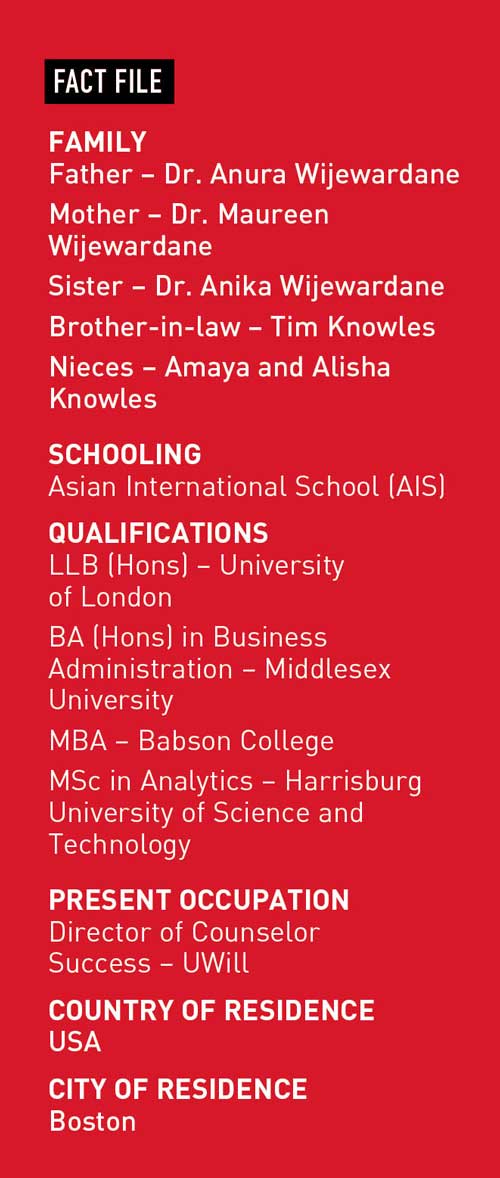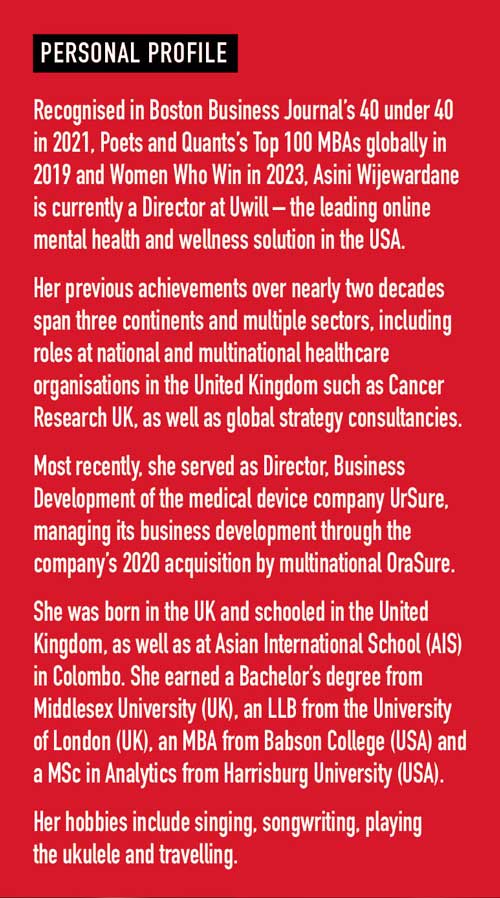Asini Wijewardane

In pursuit of social innovation
Asini Wijewardane lays claim to a track record stretching nearly two decades, and spanning three continents and multiple sectors. She has been recognised in Boston Business Journal’s 40 Under 40 in 2021, among Poets&Quants’ 100 Best & Brightest MBA graduates in 2019 and most recently highlighted by Women Who Win.
Over the years, Wijewardane has served in roles at national and multinational healthcare organisations in the UK such as Cancer Research UK and global strategy consultancies, as well as Director of Business Development of the medical devices company UrSure.
Presently, she is a director of Uwill – an online mental health and wellness solution firm in the US.
In this exclusive interview with LMD International, Wijewardane offers insights into the growth of the social innovation sphere in Sri Lanka, as well as the island’s ties with the US and how they can be improved.

Q: Social innovation can define and reinforce culture, to improve the welfare and wellbeing of individuals and communities. How have you viewed the landscape of social innovation evolving here in Sri Lanka over recent years?
A: Social innovation is often defined as innovation that addresses challenges in this sphere. Sri Lanka has always been a socially focussed society, having been regularly voted the country with one of the highest rates of volunteerism.
Over the last decade however, an important evolution in this space has been the understanding that social innovation is not solely the responsibility of the nonprofit or any one sector – any organisation or sector can and should address social challenges.
In Sri Lanka, this has been evidenced by the increase in social innovators and entrepreneurs across sectors, as well as the notable uptick in resources to help accelerate social innovation encompassing social innovation labs, and funding challenges and accelerators, supported by a range of sectors including the private sector.
I believe these changes are positive, promising and crucial to create the scale of change needed in Sri Lanka – the more organisations working towards change, the more changes we can make.
Q: What policy changes or support from the government could further encourage and facilitate social innovation across different sectors in Sri Lanka?
A: Holistic, consistent and multifaceted government support is essential to advance social innovation.
In Sri Lanka, policy and legal changes – such as tax incentives and legal recognition for social entrepreneurs – are essential to accelerate social innovation. Additionally, similar support to help develop the ecosystem of resources is vital.
Furthermore, supporting market entry and growth is key. For example, the government could provide more incentives for local customers (akin to US tax credits for electric vehicles), and leverage diplomatic relations to help social innovators connect with international markets and funding or grants.
Moreover, the government could provide direct support – such as by becoming a direct buyer or providing information linkages.
Education systems are vital to accelerate social innovation in the long term. Raising awareness of social entrepreneurship as a career path through schools and career advice centres, as well as robust tertiary programmes and courses, is crucial.
Additionally, education curriculums need to be aligned with future employment and entrepreneurial demands of the social innovation space.
Finally, education on entrepreneurial skills is important to make more people more comfortable with moving away from stability, certainty and avoiding failure, to taking risks, learning, failing and innovating to impact.


Q: Given your experience in the mental health sector, how have you viewed the stigma surrounding mental health changing in recent years?
A: The mental health stigma has reduced over the last decade, most recently being impacted by more open conversations taking place during the pandemic as well as more celebrity led awareness.
However, stigma is still more prevalent in some communities – such as among males, and older and BIPOC (black, indigenous and people of colour) communities.
To reduce stigma in Sri Lanka, awareness programmes are vital to help normalise, demystify and reframe caring for our mental health, similar to how we talk about our physical health using relatable analogies and stories.
The media can also be utilised to raise similar awareness – such as through teledramas and interviews.
And peer led social media campaigns (similar to the #MeToo campaign) can help incite, normalise and reframe conversations about mental health.

Q: What are the most promising approaches to improving access to mental health care – especially in underserved communities?
A: I believe that online mental health and wellness solutions are the most promising advancements in improving access to mental healthcare.
Online solutions increase access by reducing barriers to care, which are often faced by underserved communities – such as cost, inconvenience and stigma. They also provide access to care when there are no therapists or facilities that match their preferences proximal to them.
Furthermore, online solutions often enable providers to see more clients virtually than they could in person, increasing the capacity of care and thereby access to it.
Self-guided mental health and wellness tools also increase access to care with self-regulation and ongoing care.
Q: In your opinion, what impact has the US had on Sri Lanka’s economy, trade and investment?
A: As the world’s largest economy, the impact of the US on Sri Lanka’s economy is undeniable. The United States is the latter’s largest exporter, accounting for 25 percent of annual exports while the island imports over US$ 370 million from the US.
The US also supports upskilling Sri Lanka’s talent pool through access to higher educational opportunities – for example, by means of scholarship programmes.
Furthermore, the increase in Sri Lankan professionals working and setting up high value companies in the United States has not only brought foreign revenue to Sri Lanka but also helped grow Sri Lankan contracts and employment.
However, economic relations have evolved in recent decades. Political instability, increasing costs and brain drain has reduced Sri Lanka’s regional competitive advantage compared to countries like Bangladesh and Vietnam.
Economic downturns in the US have also impacted relations with the 2008 recession significantly impacting trade with Sri Lanka.
Moreover, the United States underpins foreign relations on unified democratic values and principles. Therefore, relations deteriorated when previous Sri Lankan regimes did not share those values or support programmes lacked partner country engagement.
Currently, bilateral relations seem strong (for example, with the launch of the Sri Lanka-US Parliamentary Friendship Association). However, they should be fostered especially given the global economic downturn ahead.

Q: How do you see the business culture in Sri Lanka evolving – particularly in the realms of innovation, diversity and sustainability?
A: Incited by global trends, Sri Lanka’s innovation ecosystem has rapidly developed in recent years with resources such as challenge-based funding and innovation labs supported by all sectors including major corporates.
Local corporates have also been increasingly implementing more sustainable practices due in part to global customer demand.
Additionally, the uptick in the number of international companies and employees in Sri Lanka bodes well for diversity, as well as accelerated innovative and sustainable practices. The country has also made promising strides in increasing diversity in entrepreneurship over the last few years such as through women focussed accelerators.
But to enhance our competitive advantage in the global market, it’s critical to focus on diversity, sustainability and innovation, in part to align with international standards such as the Fairtrade Standards.
Therefore, there is a need for more national policy support, regulations and standards, to propel innovation, sustainability and diversity across all sectors.

Q: What’s your view of the relationship between the legal system and social justice in Sri Lanka?
A: An effective legal system is foundational to a democratic country – an independent, effective legislature that supports a system of checks and balances, upholds the rule of law and protects citizens’ rights is often a key difference between democratic and other regimes.
In the past, Sri Lanka’s legal system and professionals have been instrumental in addressing injustice – such as during last year’s crisis. We need to continue providing support for our legal and justice system, to address inequality and discrimination.
A strong justice system that aligns with global practices is often a fundamental requirement of foreign supporters and investors so this could also have a positive economic impact.
And increasing awareness, and expanding access to legal mechanisms and protections, to those who face inequality and discrimination is vital so that affected citizens understand legal protections, and have access to resources and recourse.
